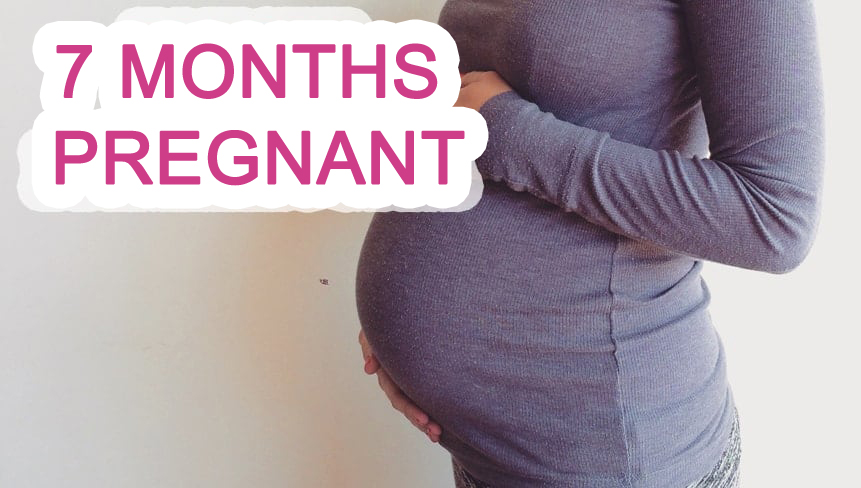In the captivating world of pregnancy, every week brings a flurry of changes; for both you and your little one. As you cross the seven-month milestone, anticipation builds with each flutter in your belly. This month is particularly crucial; your baby is growing exponentially, developing essential functions and might even start responding to external stimuli! Let’s embark on this illuminating journey together, exploring baby development, identifying common symptoms, and gleaning expert tips that can make navigating through this phase much simpler. Trust us, by the end of it, your womb won’t be the only thing expanding – mind-blowing insights are just around the corner!
At 7 months pregnant, common symptoms may include sciatica, pelvic pain, constipation, Braxton Hicks contractions, fatigue, and possible light bleeding or spotting. Baby development at this stage includes the production of surfactant in the lungs, opening and closing of eyes, fat accumulation, and melanin production in the skin. It’s important to consult with your healthcare provider for personalized advice and care during this stage of pregnancy.
Table of Contents
What to Expect in Your 7th Month of Pregnancy
As an expectant mother, the seventh month of pregnancy marks the beginning of the third trimester. You’re only a few months away from holding your little one in your arms. The uterus is now expanding to accommodate the growing baby, and you’ll notice a significant increase in size around your abdominal area. Many women begin to experience more frequent Braxton Hicks contractions, which are more intense than before. It’s normal to feel apprehensive as the delivery day approaches, but remember that it’s perfectly normal to have these thoughts.
It wasn’t until my seventh month of pregnancy that I realized how unprepared I was for my baby’s arrival. There were so many things to consider – from creating a birth plan, shopping for baby items, and preparing family members to get involved in baby care. I felt overwhelmed and experienced heightened levels of anxiety which took a toll on my health.
- According to the World Health Organization, a fetus at 7 months usually weighs approximately 2.5 pounds and measures around 14 inches.
- The American College of Obstetricians and Gynecologists state that common symptoms in the seventh month of pregnancy can included sciatica, pelvic pain, fatigue, and possible light bleeding or spotting.
- As per research data, pregnant women at this stage could gain about a pound a week as the baby continues to grow rapidly.
Common Symptoms at 7 Months Pregnant
At 7 months pregnant, some common symptoms you may experience include sciatica – characterized by a sharp pain running down your leg – pelvic pain due to pressure on the pelvic area, constipation, fatigue due to hormonal changes and increased fetal weight, as well as possible light bleeding or spotting.
It’s normal for all females not experience these symptoms simultaneously; some might only experience some and others other symptoms. Always consult with your healthcare provider if any symptom lasts long or feels worrisome.
| Symptoms | Solutions |
|---|---|
| Sciatica | Stretching exercises, massages, warm baths |
| Pelvic Pain | Sleeping on your side with pillows between your legs |
| Constipation | Drinking plenty of water, eating high-fiber foods |
| Fatigue | Taking short naps when needed |
| Light Bleeding/Spotting | Contacting healthcare provider promptly |
While it’s essential to keep this information in mind and be aware of the potential symptoms, worrying too much can take a toll on mental health. It’s important to seek proper guidance from your healthcare provider and make necessary changes in life for better wellbeing.
Fetal Development at 7 Months
At 7 months pregnant, your baby is rapidly developing as they approach the final stages of gestation. Some key milestones during this period include the production of surfactant in their lungs, which helps with breathing once they are born. The eyes are continuing to develop and can now open and close, and they can differentiate between light and dark. Fat accumulation also continues, making them more robust and better able to regulate their body temperature. Finally, melanin produced in their skin gives them pigmentation.
At this stage in your pregnancy, your baby may weigh around 2.5 pounds and measure approximately 14 inches from head to toe. Your baby’s growth will be measured via regular checkups using various methods including ultrasounds and fundal height measurements.
While your baby’s development takes center stage during pregnancy, there are also changes happening within your body that need attention.
Your Body Changes at 7 Months Pregnancy
At 7 months pregnant, you may experience a range of new symptoms as your body continues to adapt to accommodate your growing baby. These could include sciatica (pain radiating down your leg), pelvic pain, constipation, Braxton Hicks contractions (practice contractions), fatigue, and possibly light bleeding or spotting.
It’s common for women in the third trimester to gain around a pound per week until delivery. Be sure to monitor your weight gain carefully as too much or too little can impact both you and your baby’s health.
You will have many doctor appointments during this time where they will check on the progress of your pregnancy. At these visits, be sure to express any concerns or questions openly and honestly.
Additionally, it is essential to keep track of possible complications that could arise with a pregnancy at this stage, such as preterm labor or preeclampsia. Keeping yourself healthy with a balanced diet, mild exercise, and proper sleep will help reduce the risk of such complications.
Regular doctor check-ups play an important role in helping you maintain good health during pregnancy.
- During the seventh month of pregnancy, it is common to experience new symptoms such as sciatica, pelvic pain, constipation, Braxton Hicks contractions, fatigue, and possibly light bleeding or spotting. It’s important to monitor weight gain carefully and express any concerns or questions at doctor appointments. Keeping a balanced diet, exercising moderately, getting enough sleep, and attending regular check-ups helps reduce the risk of complications like preterm labor or preeclampsia.
Health and Regular Doctor Check-ups
At 7 months pregnant, it’s critical to prioritize health, both for the mother and baby. Regular checkups with your doctor can help ensure that everything is moving along smoothly. During these appointments, the doctor will conduct various tests to monitor fetal growth and health, including fundal height measurements. At this stage, weight gain can be significant – up to a pound each week – so your doctor might track your weight more closely than before.
Preparing for Motherhood: Tips for 7 Months Pregnant Women
As you advance through the final trimester of pregnancy, it’s crucial to start thinking about life after birth. The following are some tips that expectant mothers at 7 months pregnant should keep in mind:
First and foremost, consider hiring a doula or midwife for support during childbirth. Not only can they provide emotional support during delivery, but a doula or midwife could also offer additional knowledge on pain management techniques and assist in creating a suitable birth plan that aligns with your preferences fully.
In addition to seeking external help, focus on creating a comfortable environment at home that accommodates you and the baby’s needs. This could mean setting up a nursery room or investing in essential baby furniture like a crib, stroller or breastfeeding pillow.
Preparing for motherhood is like running a marathon; planning ahead can help alleviate discomfort and stress levels significantly.
Another essential tip is to learn how to monitor the baby’s movements within your womb actively. A reduction in fetal activity is often an indicator of underlying stress. Tracking movement patterns can also help detect potential complications early enough to seek medical intervention.
Finally, explore all available options and research recommended baby products thoroughly before adding them to your baby shower registry. Consider cord blood donation or storage early on in preparation for birth.
Remember: maintaining proper physical health not only promotes your body’s general well-being but significantly influences the baby’s growth and development. At this crucial stage, every decision must align with creating a safe and healthy environment for both mother and baby.
Advancing into the Third Trimester at 7 Months
Advancing into the Third Trimester at 7 Months:
At seven months pregnant, you are advancing into the third trimester of pregnancy. The third trimester is characterized by a host of myriad developed symptoms peculiar to individual expectant mothers. It becomes more taxing as the delivery date approaches, which typically ranges from 37 to 42 weeks’ gestation. At the beginning of the third trimester, it’s recommended that routine visits to your obstetrician are kept scheduled biweekly until week 36 and then weekly towards the end.
It’s also essential that moms-to-be start monitoring their baby’s movement to ensure they are active and kicking frequently after week 28. If you notice a decrease in movements or develop any concerning symptoms such as abdominal pain, contractions, vaginal bleeding, or fluid leakage- reach out to your healthcare provider right away. With each prenatal care visit now, the healthcare provider will take fundal height measurements to determine if there have been appropriate fetal growth and position.
This period can be an exciting time for both you and your partner as you start finalizing preparations for delivery day! You may begin exploring options such as hiring a doula or planning a gender reveal party. It can also serve as a good time to finalize that baby shower registry if you haven’t already.
You could consider cord blood banking since stem cells collected from umbilical cords are rich in potential treatment options for spinal cord injuries, leukemia and more. While parents can choose between private cord blood banking (paying for long-term storage) and donating the cord blood publicly- most professional medical bodies prefer public donation over private banking.
Enrolling for infant CPR courses might be an excellent idea, too; it’s like hoping for the best but preparing for the worst.
Towards the end of this trimester, it’ll become harder to get comfortable when sitting or lying down- you may develop pelvic pain, sciatica, constipation and Braxton Hicks contractions. Your baby is also becoming increasingly plump as they continue to accumulate body fat. By the end of month 7, a fetus may weigh about 2.5 pounds and measure 14 inches.
It’s inevitable that you’ll gain weight during this period, with an expected average of up to one pound per week depending on several factors like your body mass index (BMI). However, maintaining healthy nutrition habits can alleviate bloating and other symptoms associated with it.
Embrace the excitement of planning for the arrival of your little one while also working closely with your healthcare provider to ensure a smooth delivery experience. Remember, every pregnancy phase comes at its pace and showing love to yourself through self-care routines like adequate sleep, hydration and exercise (if not put on bed rest) can go a long way in making this ride as memorable as possible.

Elizabeth Baker is a mother of three, wife, and the passionate mind behind this pregnancy and baby development resource. She balances her love for understanding every stage of child growth with her duties as a parent. When she’s not sharing her experiences or studying child development, Sarah enjoys family time, reading, and practicing yoga. She believes in the power of shared knowledge to enhance the beautiful journey of parenthood. Read more About me.
